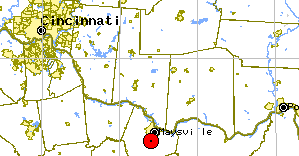The following are exerpts from Fleming County, KY Circuit Court
records submitted by Elenanor.
1. Fleming Co, KY Circuit Court File # 6292, Abner Hord vs. Lawrence
Dye (defendent), September 1838
Lawrence owed Abner Hord $75 of a $200 loan which had been "due since
25th day of December 1837 and no part has been paid. The said Lawrence
resides or formerly resided in The County of Fleming where he has a
tract of land containing 157 acres, 2 slaves and a considerable portion
of personal estate as your orator is informed, which said property is
under the management and [could not read this word] of his brother John
Dye. But the said Lawrence Dye, about the last of December 1837 left
the state of Kentucky and went to the State of South Carolina with some
horses and mules as he was informed, and the said Lawrence Dye has not
returned ... since." Hord asked for an attachment against the lands &
effects of Lawrence Dye and payment of court costs. The Sheriff was
authorized to seize the lands to the amount of $75 plus interest and
court costs and hold them until further order of the court.
2. Fleming Co Circuit Court File # 6676, David Henderson vs Lawrence
and Mary Ann Dye, 11 May 1839
Lawrence owed David Henderson $100 for the "purchase of smith work" 19
Oct 1837. Lawrence was in the "Southern Country of Georgia" and had not
returned as expected. His wife, Mary Ann, and his personal property
were still in Fleming County, Kentucky. On 16 Nov 1839, Lawrence's
property was sold as decreed by Circuit Court: 1 mantle clock, 3 beds
and furniture, 1 secretary, 1 dining table, 1 candlestand, 1 looking
glass, 6 common split bottom chairs, one cupboard and contents, 1 sorrel
colt, 16 head of sheep, 4 hemp breaks, 1 fire shovel, 1 teakettle, 1
cutting machine, 1 ten gallon kettle, 2 smoothing irons, 2 shovel
ploughs, 1 wash tub, 1 churn, 1 grindstone, 1 McCormick plow, 1 Cary
plough. Sold for a total of $127.14. In testimony his brother, John
Dye, stated that Lawrence went to Georgia about 15 Sept 1838 and was
last heard from in Crawfordsville, Georgia and that he had with him when
he left some household and kitchen furniture and some stock consisting
of horses, mules, hoggs [sic], cattle and sheep, "and further this
deponent saith not".
3. Fleming Co, KY Circuit Court File # 6990, Jeremiah Wells vs.
Nehemiah and Lawrence Dye, Sept 1840
This suit concerned a note for $640 owed since 1837, with Nehemiah Dye
as surety. However in September 1840 Nehemiah "has little or no
property of value". An order was entered to seize and sell "the
property of said Dye in the hands of his wife, Nehemiah Dye, and Samuel
Fitzgerald for payment of $640 with interest from March 1838" plus
costs. The Sheriff seized 1 bay mare ($60), 1 dun mare ($40), 4 coults
[sic] ($35 each), 1 mule ($30), 2 milk cows ($12 each), 8 yearling
calves ($8 each), 1 [Learham]? calf ($50), 80 head of stock hogs ($80),
17 head of hogs (?), 5 tons of hemp ($350).
4. Fleming Co, KY Circuit Court File # 7243, Claiborn F. Wood vs.
Lawrence and Mary Ann Dye and Samuel Fitzgerald, March 1841
Lawrence owed Claiborn F. Wood $83.49. Hiram Dye and Henry C. Tully
made a deposition at the counting room of Anderson and Wood, Helena,
Mason County, KY, who swore the above amount was a just and true
accounting of goods purchased of Anderson and Wood in February 1838 -
November 1838 (tea, sugar, coffee mill, molasses, indigo, etc.). The
Sheriff seized slaves, Harriet ($200) and Henry ($300) from Mary Ann.
Kari Northup sent in the following comments about Lawrence Dye:
At least 3 of
Abigail's children emigrated to Illinois (Lawrence, John and Nehemiah), and of
those at least two (John & Lawrence) fought in the Civil War in the UNION
army. I have thought before that that fact was kind of ironic. Abigail
inherited at least one slave in William's will - don't know what happened to
that slave. Abigail married Zephaniah White in 1824 after the death of her
husband (& cousin) Peter Dye in 1822. Lawrence Dye is also the ancestor who I
have the military description of having dark complexion, black hair and black
eyes - I have wondered about Indian blood - haven't found it yet, but the
description makes me not rule it out. Another ironic thing is that on
Lawrence's certificate of disability for Discharge from the army it says:
"During the last two months said soldier has been unfit for duty for sixty
days in consequence of diarrhea and old age - he being fifty six years of age;
the long heavy marches through Kentucky, during the month of October, broke
him down completely, and unless he is soon discharged will die."
So Lawrence was in an unit from Illinois that saw duty in Kentucky - he was
fighting for the Union, and probably knew folks that had stayed in Kentucky
that were fighting for the Confederacy - maybe some of his relatives. The
Civil War was so full of that kind of thing, it really would be so hard.
 Kenneth Dye was born on May 17, 1756/7 in Plainfield, New Jersey and died in 1817
in Mason County, Kentucky. He married (1) Jane Vanderbeck who died before 1815.
[One of Joseph Dye's daughters had married a Vanderbeck - Joseph would have been Kenneth's uncle]
Kenneth Dye was born on May 17, 1756/7 in Plainfield, New Jersey and died in 1817
in Mason County, Kentucky. He married (1) Jane Vanderbeck who died before 1815.
[One of Joseph Dye's daughters had married a Vanderbeck - Joseph would have been Kenneth's uncle]